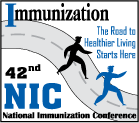
|
|
CDC NIP/NIC Home Page
|
Wednesday, March 19, 2008 - 2:20 PM
91
All in the Family: Exploring Venues for Educating Pregnant and Parenting Teens
Kimberly Ralston, San Diego Immunization Partnership, a UCSD contract with the SD County Immunization Branch, 9500 Gilman Drive # 0720, La Jolla, CA, USA and Christine A. Garcia, County of San Diego Health and Human Services Immunization Branc, 3851 Rosecrans St., P574, Suite 704, San Diego, CA, USA.
Learning Objectives for this Presentation:
By the end of the presentation participants will be able to:
• identify immunizations recommended during pregnancy, and name three barriers pregnant and parenting teens have to receiving immunizations.
• list several non-traditional venues for presenting immunization information to adolescents.
Background:
Pregnant and parenting teens are an interesting and often overlooked population for receiving vaccine information. They are a great population to demonstrate the value of “cocooning” since teens, their newborns, and older family members all have different and specific recommendations.
Setting:
A presentation given at the California Alliance Concerned with School Age Parenting and Pregnancy Prevention (CACSAP) Conference offered the authors a trial situation for presenting information to non-traditional organizations specifically targeting pregnant and parenting teens.
Population:
The target population was social work professionals who work with pregnant and parenting teens.
Project Description:
An “Immunization 101” presentation was developed specifically for conference participants.. Pregnant and parenting teens were described as a unique population for immunization education because of their contact with other age groups. Immunization requirements for childcare and school entry were discussed. Attendees heard about how vaccines work to develop immunity and were offered the chance to ask about vaccine myths.
Results/Lessons Learned:
Many social work professionals working with teens were not aware that pregnant women could receive vaccines and that pregnancy is a time when women can catch up on some immunizations. School-connected social work programs are an effective venue for immunization information because of their direct and prolonged contact with pregnant and parenting teens.
See more of Targeting Adolescents Outside the Medical Home
See more of The 42nd National Immunization Conference (NIC)
See more of The 42nd National Immunization Conference (NIC)